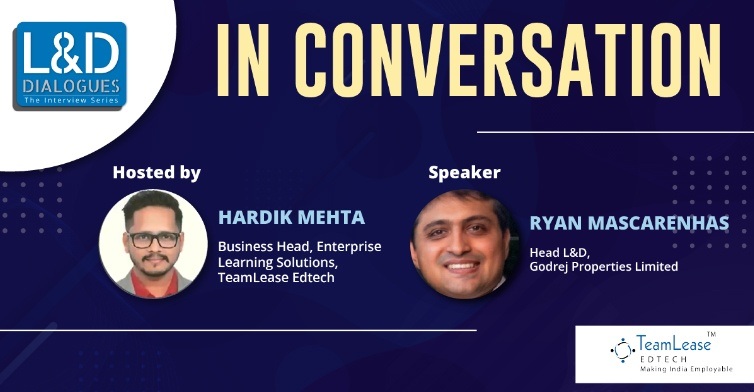
Future Of Learning Is AI Based
Welcome back to another session of L&D Dialogues, a knowledge-sharing initiative of TeamLease EdTech where leaders from the L&D fraternity come together to discuss and debate a topic of interest.
In our recent session held as part of the Interview Series of L&D Dialogues, we invited Ryan Mascarenhas, Head L&D, Godrej Properties Limited, for an interactive one-on-one conversation with Hardik Mehta, Business Head, TeamLease EdTech, ELS.
Mr. Mascarenhas comes with an experience of 17 years in Learning, Talent & Organization Development. He has worked in the field of Banking, IT, Retail, FMCG, Manufacturing & Real Estate. His specialties are in organization Learning & Capability Strategy, Design of Leadership & Business-Critical Capability Programs & Journeys, Facilitation & Coaching, and Stakeholder Relationships. During his academic days, he won a Gold Medal for the highest CGPI.
Instilling organizational culture in remote working teams
There are diverse people that come to the workplace and add a little something to the culture. But certainly, there is an organizational ethos in the way people operate, which differs from company to company. During the pandemic, people were at home connected through Zoom, MS teams, and other virtual platforms. They connected once a day or every two hours. But these are only benefits of formal interactions. When it comes to informal meetings, people have to come to the office. Because free-flowing conversations are only formed when we meet in person. And as many leaders rightly said, culture gets built because of the stories that get swapped. This balance of remote and in-office teams suggests a hybrid model of working in the future.
But for the workforce that is going to permanently be working from home, it is best to create a safe space for them to have an unstructured, unsupervised dialogue with co-workers, where stories can be shared without any hesitation. Watch the video here.
The learning and development landscape has changed dramatically over the last couple of years. The rapid rate of change has pushed l&d professionals to rethink how training programs are managed and delivered in organizations across the globe. The future will continue to be blended with AI-based and learning nugget tests. Here blended means that there is a certain self-paced portion where there is either e-learning or a simulation or activity that the learner will do independently. In his organization,.Mascarenhas was surprised by the response to their learning experiment. Participation for the life component was upwards of 80%and for the self-paced component, was rather half of that around 40%. The key takeaway from this data was that learning is a social activity. Even if we go back in time, our schools and colleges had molded the learning pattern into a social activity. Be it with friends or colleagues, people like to come together to study, which opens a platform for them to talk and listen to the subject.
Immersive learning and VR have taken the L&D and HR world by storm and are a cornerstone of corporate learning today. The company Godrej had also implemented immersive learning in the training for the staff. They tried a range of virtual learning reasonably replicating the real-life scenarios. For instance, when a person joins a factory, they get into the learning room and put on the headset, where people can actually spray paints on a car virtually. After the process, it gives them a report of performance.
Also read: A healthy balance between digital and human
How can L & D managers encourage learning and innovation in remote working?
When teams are working remotely, Ryan Mascarenhas suggested a couple of things that are needed to keep in mind. Firstly, AI-based platforms become doubly important, irrespective of whether someone is accessing them from the office, or from a remote location. The ability to pull appropriate nuggets of information is going to be key. Secondly, there is the role of content creation. But it's no longer just creation, it's about curation as well.
He believes that the traditional elearning based on a few visuals doesn't have a great future. He said, ‘We have a generation of learners, which is used to learning in quick, sharp content, and aren't interested in the sort of elearning which has been the mainstay’. An entry-level person who wants to specialize in a role of his/her choice has to go through various learning modules, work on projects, and join live sessions and simulations. It is not going to be a one day process but a whole journey. Hence, a full learning journey is the present as well as going to be the future. And these learning journeys, which are not the traditional elearning, are self-paced and provide the person with resources, and multiple avenues of learning.
If you like the conversation with Ryan Mascarenhas, watch the videos here.
